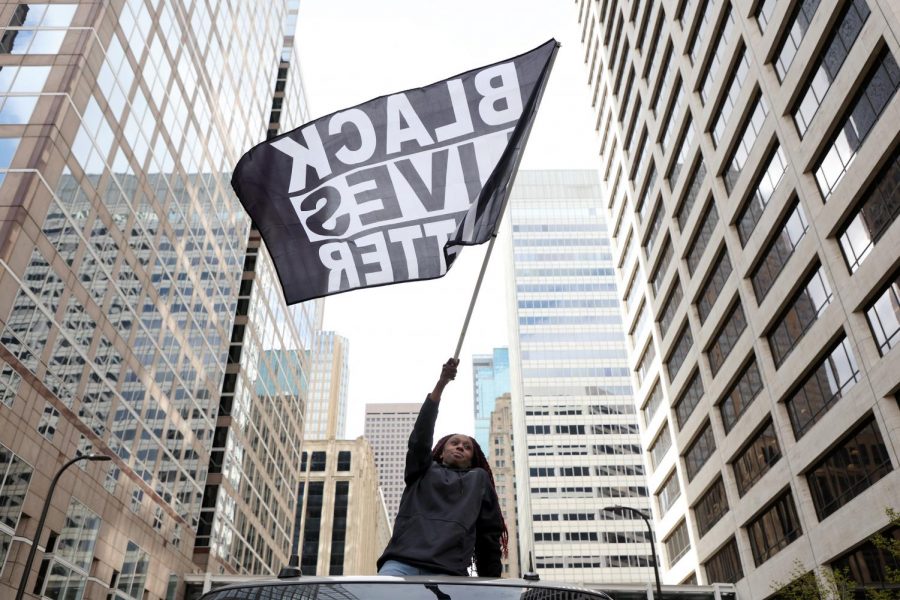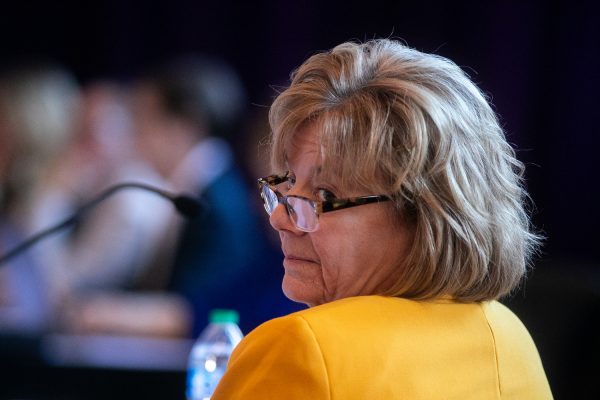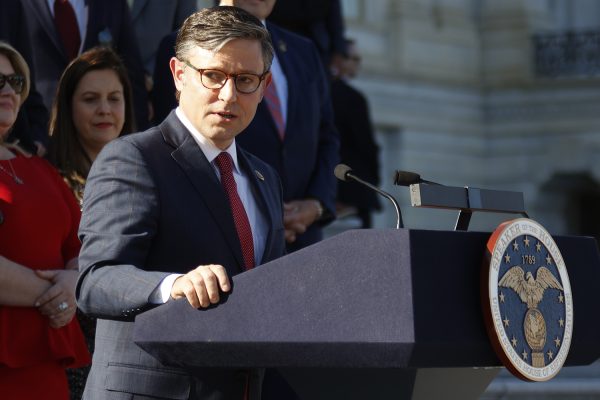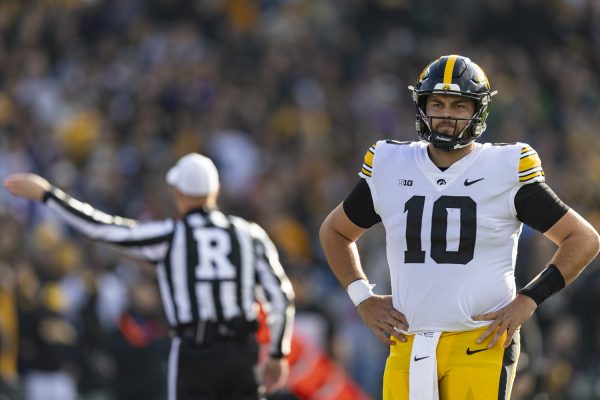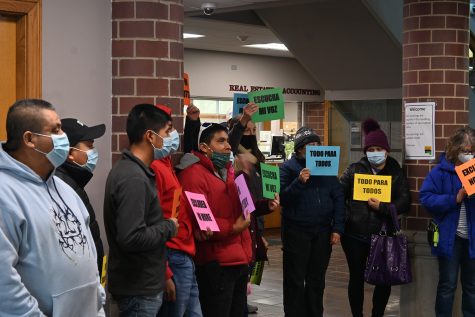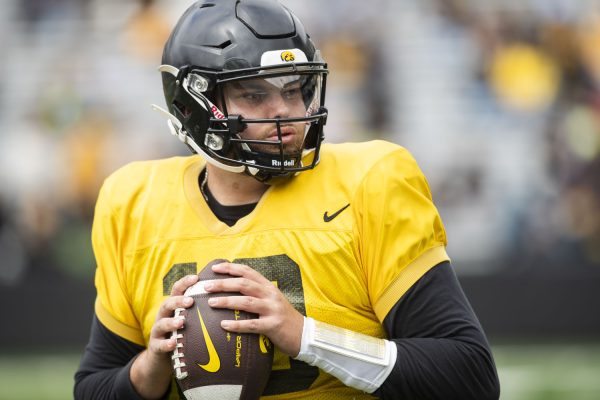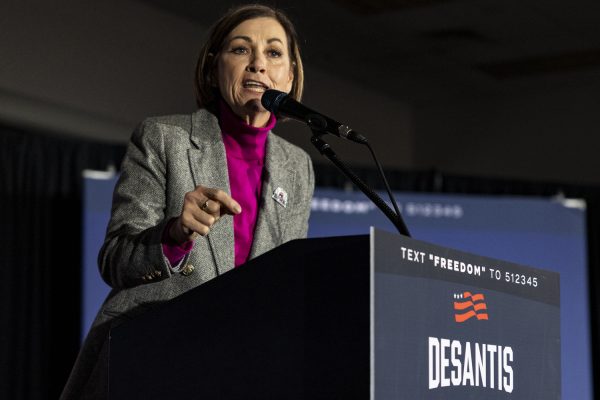Derek Chauvin guilty on all counts in the death of George Floyd
April 20, 2021
MINNEAPOLIS — Jurors convicted former Minneapolis police officer Derek Chauvin on Tuesday of all the counts filed against him — second-degree unintentional murder, third-degree murder and second-degree manslaughter — in the killing George Floyd, who died after being pinned under Chauvin’s knee for more than nine minutes last May.
Chauvin looked stern and glanced around the courtroom as the verdicts were removed from an envelope and read by Judge Peter Cahill.
The fired police officer had on a paper mask and showed no significant reaction. When his bail was revoked, he stood up, put his hands behind his back, was handcuffed and gave a nod to defense attorney Eric Nelson as he was led out the back door of the courtroom by a Hennepin County sheriff’s deputy.
Cahill thanked the jurors, who each confirmed their votes as correctly read. “I want to thank you for not only jury service, but heavy duty jury service,” the judge said.
He asked the attorneys to file written arguments regarding aggravated sentencing factors that could add time to Chauvin’s sentence for restraining Floyd on the pavement at 38th and Chicago, an act captured on bystander video that went viral and played a vital role in the verdicts.
Attorney General Keith Ellison, whose office oversaw Chauvin’s prosecution, saluted the “bouquet of humanity” who attempted to intervene and recorded Floyd’s final moments.
“They didn’t know George Floyd, they didn’t know he had a beautiful family, they didn’t know that he was a proud father or had people in his life who loved him,” Ellison said to reporters as members of his legal team stood behind him. “They stopped and they raised their voices because they knew what they were seeing was wrong. They didn’t need to be medical or use-of-force experts. They knew it was wrong, and they were right.”
Co-prosecutor Jerry Blackwell followed and said, “No verdict can bring George Perry Floyd back to us, but this verdict does give a message to his family that his life mattered, that all of our lives matter, and that’s important.”
Matthew Frank, another of the prosecutors, kept his comments brief and said, “First and foremost, this is for you, George Floyd, and for your family and friends.”
Nelson left the courtroom without comment.
A prepared statement from Benjamin Crump, the Floyd family attorney, read, “Painfully earned justice has arrived for George Floyd’s family and the community here in Minneapolis, but today’s verdict goes far beyond this city and has significant implications for the country and even the world. Justice for Black America is justice for all of America.
“This case is a turning point in American history for accountability of law enforcement and sends a clear message we hope is heard clearly in every city and every state. We thank Minnesota Attorney General Keith Ellison and his team for their fierce dedication to justice for George. But it does not end here. We have not forgotten that the other three officers who played their own roles in the death of George Floyd must still be held accountable for their actions, as well.”
One of Floyd’s brothers, Philonise Floyd, was in the courtroom for the verdicts. He hugged prosecutor Jerry Blackwell, Ellison and another prosecutor. Ellison and Blackwell heartily shook hands. The younger brother has been a steady presence on behalf of the family.
The Police Officers Federation of Minneapolis responded in a statement that read: “There are no winners in this case, and we respect the jury’s decision. We need the political pandering to stop and the race-baiting of elected officials to stop.
“In addition, we need to stop the divisive comments, and we all need to do better to create a Minneapolis we all love.” The statement added in a line geared toward residents of Minneapolis that the federation “stands with you and not against you.”
Reaction from leading officeholders was swift, among them Mayor Jacob Frey, who said in a statement: “Today the jury joined in a shared conviction that has animated Minneapolis for the last 11 months: they refused to look away. They believed their own eyes and affirmed George Floyd should still be here today.”
A statement from Gov. Tim Walz said, “Today’s verdict is an important step forward for justice in Minnesota. The trial is over, but our work has only begun.”
The governor add that “no verdict can bring George back, and my heart is with his family as they continue to grieve his loss. Minnesota mourns with you, and we promise the pursuit of justice for George does not end today.”
The foreperson was a white man in his 30s who works as an auditor. He pledged during the jury selection process that he could examine the evidence “from a viewpoint of the law.”
He and his fellow jurors remained still and quiet and kept their eyes on the judge until called upon by the judge to affirm their verdicts individually. They departed the courtroom revealing no visible emotion.
Jurors, who were sequestered, reached their decision after hearing closing arguments from the prosecution and defense Monday. They started deliberations afterward. Jurors heard from 44 witnesses over 14 days of testimony. The trial began seven weeks ago on March 8 with jury selection, and was livestreamed across the world by several media outlets on multiple platforms.
The jurors were asked to decide between the prosecution’s claims that Chauvin used excessive force and an unsanctioned maneuver when he knelt on Floyd’s neck for about 9 1/2 minutes on May 25, 2020, and the defense’s argument that Chauvin was following his training when he arrested an unruly Floyd, who died after being restrained by the former officer.
The cause of death became a key issue, with prosecutors telling jurors Floyd, 46, died of asphyxia from low oxygen when Chauvin knelt on his neck as former officers J. Alexander Kueng knelt on his buttock and thigh area and Thomas Lane knelt and held onto his legs. Former officer Tou Thao kept angry bystanders at bay.
The officers were arresting him for using a fake $20 bill to buy cigarettes at Cup Foods in south Minneapolis.
Hennepin County Chief Medical Examiner Dr. Andrew Baker ruled that Floyd died of a homicide, an act caused by another person, and that the cause of death was “cardiopulmonary arrest complicating law enforcement subdual, restraint, and neck compression.” He also listed hardening and thickening of the artery walls, heart disease and drug use as “other significant conditions.” Fentanyl and methamphetamine were found in Floyd’s system.
Addressing the aggravating factors in an earlier filing, the prosecutors wrote:
— Floyd was “particularly vulnerable” because his hands were handcuffed behind him.
— Floyd was treated with “particular cruelty.” Prosecutors said at trial that Chauvin remained on Floyd’s neck even though he wasn’t breathing and didn’t have a pulse for nearly five minutes. Bystander video also captured Floyd repeatedly saying he couldn’t breathe before he became unresponsive.
— The officers abused their position of authority.
— The officers committed the act as a group.
— The officers’ actions occurred in front of children. The youngest witness was Judeah Reynolds, then 9. Her cousin, Darnella Frazier, then 17, recorded and shared video of the incident, which many credit for leading to the criminal prosecution.
Defense attorney Nelson argued at trial that the bystanders, which also included adults, were hostile toward the officers and created a potential threat.
Second-degree unintentional murder is punishable by up to 40 years in prison. Third-degree murder is punishable by up to 25 years in prison. However, Minnesota sentencing guidelines call for identical presumptive prison terms for both counts, starting at 12 1/2 years for someone with no criminal history.
Second-degree manslaughter is punishable by up to 10 years in prison and/or a fine of $20,000. The count carries a presumptive sentence of four years for someone with no criminal history.
The verdict came at a time of heightened tensions in the metro area following the April 11 death of Daunte Wright, a 20-year-old Black man who was fatally shot during a traffic stop by then-Brooklyn Center police officer Kimberly Potter.
Then-Brooklyn Center Police Chief Tim Gannon, who has since resigned, said Potter mistakenly fired her gun instead of a Taser while assisting in the arrest of Wright, who had been stopped for expired tabs and was found to have a warrant. Potter, who also resigned, was charged last week with second-degree manslaughter.
Wright’s death led to several nights of protests outside the Brooklyn Center Police Department, where police fired rubber bullets, tear gas and flash-bang grenades at demonstrators, alarming residents of an apartment building across the street who said they were being impacted. Police also accused some demonstrators of throwing objects, including cans and bricks, at police.
The death of Floyd, who was Black, under a white officer’s knee sparked demonstrations across the world and a racial reckoning that prompted calls for defunding the police. It led to alterations to the long-held names of popular musical acts and the rebranding of well-known products that had used racially insensitive terminology or mascots, among other changes.
Many activists and community members had looked to Chauvin’s trial as a test of the criminal justice system and a potential turning point in community-police relations, only to be disrupted by Wright’s killing.
Family attorney Crump, who helped negotiate a record $27 million settlement with the City of Minneapolis, is also representing Wright’s family.
Chauvin was the fourth officer tried in Minnesota for killing a civilian on the job. Former St. Anthony police officer Jeronimo Yanez was acquitted in 2017 for fatally shooting Philando Castile during a traffic stop. Former Minneapolis police officer Mohamed Noor was convicted in 2019 of third-degree murder and second-degree manslaughter for fatally shooting Justine Ruszczyk Damond while responding to her 911 call about a possible sexual assault in an alley. Noor, who is serving a 12 1/2-year prison term, was acquitted of second-degree murder.
Noor’s conviction was upheld by the Minnesota Court of Appeals, a decision that the Minnesota Supreme Court will review in June.
Washington County sheriff’s deputy Brian Krook was acquitted last year for fatally shooting Benjamin Evans, who was intoxicated, suicidal and had a gun in his hand but had not threatened to harm officers.
Kueng, Lane and Thao are scheduled to be tried Aug. 23 for aiding and abetting second-degree murder and manslaughter in Floyd’s death. All three, who were fired like Chauvin, are out on bond.
———
(Star Tribune staff writer Rochelle Olson contributed to this report.)
©2021 StarTribune. Visit at startribune.com. Distributed by Tribune Content Agency, LLC.



